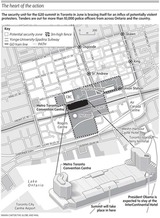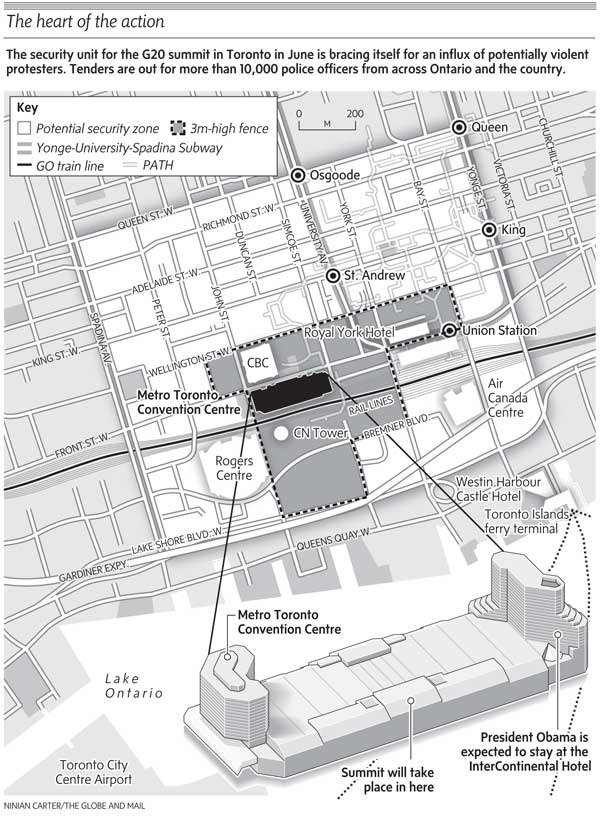
2010-04-26
‘It’s up to the cops’ whether things get violent, protest organizer says
Anna Mehler Paperny
They’re preparing buses, itineraries, bathrooms and places to crash for the night; they’re fundraising, holding media-training workshops and setting up a detailed, week-long schedule of events.
Organizers behind the protests surrounding Toronto’s G20 summit in June expect people to come from as far as Vancouver, Quebec City and the United States, representing everyone from labour groups to women’s shelters and militant students.
The summit’s integrated security unit is bracing for an influx of protesters, with tenders put out for thousands of police officers from across Ontario and the country. They’ve taking possession of one of the largest film sets in North America to use as a staging ground and potentially as a place to keep detained protesters.

At the same time, the protesters have plans of their own – from dance parties to a People’s Summit, marches and so-called Black Bloc tactics, that include confrontational methods that became notorious a decade ago.
The force and intent of the planned opposition brings to mind 2001 in Quebec City and 1999 in Seattle, where demonstrations erupted in violence, with tear gas being fired on masked protesters.
_“I think for the most part, people are planning on protesting peacefully during that time. Obviously, from a security perspective, we’re planning for any eventuality.” — Meaghan Gray, Toronto police G20 planning team
But Syed Hussan, a spokesman for the Toronto Resistance Mobilization Network, said this year’s summit won’t be a repeat of Seattle.
“It’s been 10 years,” he said. “We grow up. We come up with new tactics. We learn new strategies. We’re going to talk about a scale that might be as big or bigger, but it’s not the same tools. I mean, this was before Facebook. … We can tweet.”
Mr. Hassan said the advent of social media gives protesters many more options.
The mobilization network Mr. Hussan represents is liaising with groups across Toronto, Canada and elsewhere, attempting to co-ordinate the protest actions of dozens of divergent interests – and trying to find a place to put them all.
He refuses to even estimate how many people are coming – although it’s likely in the thousands – or how much it will cost to feed them, house them and equip them with signs and media spokespeople.
A group of law students is providing pro bono legal services, and has volunteered to monitor protests as observers and, if necessary, help bail out protesters. Legal updates will be sent throughout the week, Mr. Hussan said, as well as tweets.
Mr. Hussan emphasizes much is still in the planning stage, and he’s not sure what, exactly, will come of the numerous days of action protesters plan.
Will things get violent? “It’s up to the cops,” he said. “You put 15,000 people on the streets armed with tear gas, sonar cannons, right? I assure you, none of us has a sonar cannon. Nobody has a taser.”
Councillor Adam Vaughan, in whose Trinity-Spadina ward the summit and much of the surrounding demonstrations will take place, says he hasn’t been in touch with protest planners.
“These events attract a lot of people. I’m hopeful that when folks come to talk about the global economy, no one trashes the local one … and that whatever sort of disturbances there are, it doesn’t require imprisonment.
“My job is to make sure my residents and my businesses are talked to and given as much information as possible. … That’s really my focus.”
Meaghan Gray, with the Toronto police force’s G20 planning team, said police have been in touch with groups like the Toronto Resistance Mobilization Network, although she wouldn’t elaborate on the nature of their interactions.
“I think for the most part, people are planning on protesting peacefully during that time. Obviously, from a security perspective, we’re planning for any eventuality,” she said. “We want to co-operate with protest groups that are intending to protest peacefully. … Not everybody is as willing to participate in that process.”
Paul-Émile Auger was only 13 years old when Quebec City protesters and police took over his Old Quebec neighbourhood during the summit in 2001.
“I had no choice but to get interested in what was going on – I mean when there’s riot police and people running, this was like a battlefield in my backyard,” he said. And he’s been hooked ever since.
He’s part of a small group of people planning to make the trip from Laval – mostly sociology students like him from Laval University. He suspects they’d be able to fit in a borrowed van, as opposed to Rage, a far larger group coming from Montreal, which he said will likely require three or four buses.
Mr. Auger’s group is trying to send a message, rather than incite violence. But “to make a stand,” he says, they have to try to get behind the security fence.
“What we want is to confront, to get a message across,” he said. “Personally, I don’t want this to be violent. But I know that often when there are calls for Black Bloc formation or other street tactics, this is often a sign of an escalation and of much more violence.”
